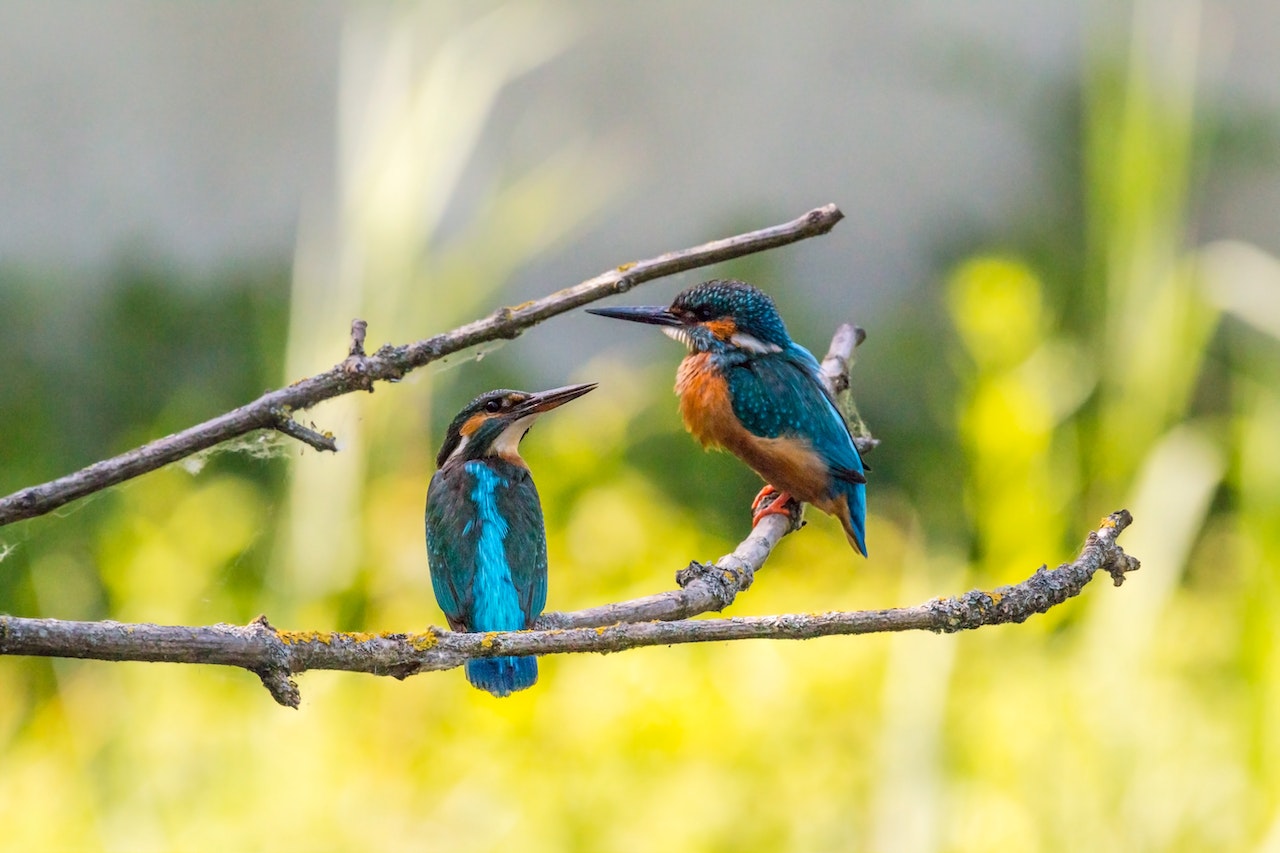Why Sounds Impact Us
Have you ever noticed how certain sounds of nature can evoke strong emotions within us? From the calming sound of ocean waves to the uplifting melody of birds singing, these sounds have a powerful effect on our mood and well-being.

Sound can evoke strong emotions and memories, and it can also create a sense of connection between people. Music, in particular, has the ability to lift our spirits, calm us down, or make us feel more energized. Sound can also serve as a form of communication, allowing us to express ourselves and convey information to others. In addition, the sounds of nature have been shown to have a calming effect on our bodies and minds, helping us to relax and de-stress. Overall, the power of sound is deeply ingrained in the human experience and plays an important role in our emotional and physical well-being.
In this article, we will explore some of the most commonly associated natural sounds with human emotions, and how they can impact our physical and mental health.
The Soothing Sounds of Water
Water has always been associated with relaxation and tranquility. The sound of ocean waves, a babbling brook, or raindrops falling on a rooftop can create a sense of calm and peace within us. Studies have shown that listening to the sound of water can lower stress and anxiety levels, as well as improve sleep quality.
Water sounds are particularly effective in inducing relaxation because they are non-threatening and often associated with positive memories and experiences, such as vacations at the beach or swimming in a pool. This is why many relaxation and meditation programs incorporate water sounds into their sessions, using recordings of waterfalls, ocean waves, or rainstorms to create a peaceful ambiance.
Furthermore, the sound of water can have a positive impact on sleep. The white noise produced by water sounds can drown out other noises that may be keeping us awake and make it easier to fall asleep. Studies have shown that people who listen to natural sounds, such as the sound of rain or waves, experience better quality sleep and wake up feeling more rested.
Overall, the soothing sound of water has the power to induce relaxation and promote feelings of well-being. Whether it’s listening to a recording of a babbling brook or simply taking a walk by a nearby lake or river, incorporating water sounds into our daily lives can have a significant impact on our health and well-being.
The Uplifting Sounds of Birds
The sound of birds singing is often associated with happiness and joy. Hearing birds chirping in the morning can lift our mood and energy levels, as well as reduce feelings of sadness and depression. In fact, studies have shown that listening to birdsong can improve cognitive function and increase creativity.
The beauty of bird sounds lies in their diversity. From the trilling of a thrush to the warbling of a wren, each species has its own unique song that can evoke different emotions in listeners. For example, the cheerful melodies of songbirds like finches and canaries are often associated with happiness and contentment, while the haunting cries of birds of prey like hawks and eagles can be both thrilling and intimidating.
One of the reasons that bird sounds are so uplifting is their association with the outdoors and the natural world. Listening to birdsong can transport us mentally to a peaceful forest or a serene meadow, providing a sense of relaxation and escape from the stresses of modern life. Bird sounds can also be a source of inspiration and creativity, as many musicians and artists have drawn inspiration from the beauty and complexity of avian vocalizations.
For those who live in urban areas, the sounds of birds can be a welcome respite from the noise and chaos of the city. Studies have shown that exposure to natural sounds like birdsong can help reduce stress levels and improve overall health and well-being. In fact, many modern mindfulness and meditation practices incorporate the sounds of nature, including birdsong, as a way to promote relaxation and inner peace.
The uplifting sounds of birds provide a connection to nature that can improve our mood, reduce stress, and promote overall health and well-being. Whether we are listening to the cheerful melodies of songbirds or the haunting cries of birds of prey, the beauty and diversity of bird sounds can evoke a wide range of emotions and inspire us in countless ways.
The Soothing Sounds of Wind

Just like the sound of water, the sound of wind has a soothing effect on our minds and bodies. Wind is a natural sound that we encounter in our daily lives, whether it’s a gentle breeze or a strong gust. The sound of wind rustling through leaves or whistling through cracks and crevices can be calming and relaxing.
Studies have shown that the sound of wind can help to reduce stress and anxiety levels. In fact, researchers at Brighton and Sussex Medical School in the UK found that listening to natural sounds, including the sound of wind, can be just as effective as mindfulness meditation in reducing stress and improving mood. The researchers also found that the sound of wind was particularly effective in promoting relaxation.
One reason why the sound of wind is so soothing is that it is a natural white noise. White noise is a sound that contains all frequencies at the same intensity, similar to the sound of static on a television or radio. White noise can help to mask other sounds that may be distracting or disturbing, allowing us to focus on the present moment and relax.
Another reason why the sound of wind is so calming is that it is associated with movement and change. Wind is constantly shifting and changing direction, which can be a reminder that nothing stays the same forever. This can be comforting to us, especially during times of stress or uncertainty.
The sound of wind can also be associated with freedom and openness. Wind is a symbol of change and transformation, as it can cause things to move and shift in new directions. The sound of wind can remind us that we are not stuck in our current situation and that we have the power to change and grow.
The sound of wind is a powerful tool for promoting relaxation and reducing stress. Whether you’re listening to the sound of wind outside on a blustery day or using a recording of wind sounds to help you sleep, the soothing sound of wind can help to calm your mind and promote a sense of peace and well-being.
The Relaxing Sounds of Rain
Rain is another natural sound that many people find soothing and relaxing. The sound of raindrops tapping on surfaces creates a calming and peaceful ambiance that can help people unwind and de-stress. This is why many people use sound recordings of rain to help them sleep or focus on work.
In addition to its calming effects, the sound of rain has also been shown to have physical benefits. A study published in the Journal of Advanced Nursing found that listening to the sound of rain for just 10 minutes can help reduce feelings of physical pain and improve overall mood.
Rain also has cultural significance in many parts of the world. In some cultures, rain is associated with growth, renewal, and cleansing. In others, rain is seen as a symbol of good luck or a sign of divine intervention. The sound of rain can also evoke memories of childhood, playing in the rain, or snuggling up inside during a thunderstorm.
Sound of rain can have a powerful effect on our emotions and physical well-being. Whether we use it to help us sleep, relax, or focus, or simply enjoy it for its calming ambiance, the sound of rain is an important part of our natural soundscapes.
The Powerful Sounds of Thunder
Thunder is a powerful sound that has the ability to evoke strong emotions in humans. It is often associated with feelings of awe and reverence, as well as fear and anxiety. Thunder is created by the rapid expansion of air due to the intense heat generated by lightning.

Despite its potential for inducing fear, many people find the sound of thunder to be incredibly relaxing and soothing. This is likely due to the fact that thunder is often associated with rain, which is itself a calming and peaceful sound. The low rumble of thunder can be a comforting presence, signaling the arrival of a cooling rain and the promise of renewed life.
Furthermore, there is evidence to suggest that the sound of thunder has therapeutic benefits. The vibrations created by thunder have been shown to promote relaxation, reduce stress, and improve sleep quality. The low frequency rumble of thunder has also been found to stimulate the production of endorphins, the body’s natural painkillers, which can help to alleviate feelings of anxiety and depression.
In some cultures, thunder is even considered to be a sacred sound, believed to be the voice of a deity or an omen of good fortune. In Norse mythology, for example, Thor, the god of thunder, was revered for his ability to protect humanity from evil forces.
Powerful sounds of thunder can have a profound impact on our emotional state and well-being. It has the ability to evoke both fear and awe, while also providing a sense of comfort and relaxation. Whether we are listening to it as a soothing background noise or actively seeking out its therapeutic benefits, the sound of thunder is a powerful force in our lives.
Sound for Thought
The sounds of nature have a powerful effect on our mood and well-being. From the soothing sounds of water to the powerful sounds of thunder, these sounds can evoke a range of emotions within us and help us connect with nature. By taking time to listen to these natural sounds and incorporating them into our daily lives, we can improve our physical and mental health, and cultivate a deeper sense of peace and tranquility.
Accessing the sounds of nature can be as simple as taking a walk in a park, sitting by a river, or listening to bird songs outside your window. If you live in a city or urban area, you can still find ways to connect with nature through virtual nature experiences, nature sound apps, or recordings. By taking a few moments each day to listen to the sounds of nature, you can reap the many emotional and physical benefits that they offer, and cultivate a deeper sense of connection to the natural world.
Here are some links to free nature sound libraries:
- Freesound: https://freesound.org/browse/tags/nature/
- Nature Sounds for Me: https://www.naturesoundsfor.me/
- Sound Bible: http://soundbible.com/tags-nature.html
- Orange Free Sounds: https://www.orangefreesounds.com/category/nature-sounds/
- ZapSplat: https://www.zapsplat.com/sound-effect-category/nature/
- AudioJungle: https://audiojungle.net/category/sound/nature
These libraries offer a variety of nature sounds that you can use for free in your projects, including recordings of birds, insects, waterfalls, rain, thunder, and more. However, make sure to read the terms of use for each library, as some may require attribution or have restrictions on commercial use.
If you want to capture, listen to, or work with nature sounds, there are several things they could do:
- Use a high-quality microphone to capture the sounds: There are many microphones available that are specifically designed for recording nature sounds. Some popular options include the Audio-Technica AT4053b and the Sennheiser MKH 416.
- Record in a quiet location: When recording nature sounds, it’s important to find a location that is free from unwanted noise, such as traffic or airplanes. Look for quiet areas like forests, parks, or secluded beaches.
- Use a windscreen: Wind can be a major problem when recording outdoors. Using a windscreen or wind muffler can help to minimize wind noise in your recordings.
- Edit and process the recordings: Once you have captured your nature sounds, you can edit and process them to improve their quality. There are many software tools available for editing and processing audio, such as Audacity and Adobe Audition.
- Listen to nature sounds online or through mobile apps: There are many free and paid nature sound libraries available online, such as Freesound and Soundsnap. There are also mobile apps available for listening to nature sounds, such as Relax Melodies and Nature Sounds Relax and Sleep.
Remember to always respect nature and follow local laws and regulations when recording in natural areas.
Creating Playlists
Creating a playlist of relaxing sounds can be a great way to unwind after a long day or to create a calming atmosphere in your home or office. With services like Spotify or other music streaming platforms, it’s easy to curate your own personal collection of sounds that help you relax and de-stress.
To get started, think about the types of sounds that you find most soothing. Do you prefer the sounds of nature, like birds chirping or waves crashing on the shore? Or do you find instrumental music, like piano or guitar, to be more calming? Once you’ve identified your preferences, you can start searching for songs or playlists that fit the bill.
Here are some popular sounds that you might consider adding to your playlist:
- Rainfall: The gentle sound of rain can be incredibly relaxing and calming, and there are many tracks available that mimic the sound of a rainstorm.
- Ocean waves: The sound of waves crashing on the shore is another popular choice for relaxation playlists. Look for tracks that feature a mix of wave sounds and ambient music.
- Forest sounds: The sounds of the forest, like birds singing and leaves rustling, can create a peaceful and calming environment. There are many nature soundtracks available that feature forest sounds.
- Instrumental music: If you prefer music to nature sounds, consider adding instrumental tracks to your playlist. Piano or guitar music can be particularly soothing.
Whatever sounds you choose, make sure to create a playlist that is long enough to last for the duration of your relaxation session. You might also consider using headphones or a good quality speaker to enhance the listening experience.
Here are some popular artists and playlists for each of the categories:
Rainfall:
- “Rainy Mood” playlist on Spotify
- “Thunderstorm” album by Nature Sounds
- “Rain Sounds for Sleeping” album by Rain Sounds
Ocean Waves:
- “Ocean Sounds” playlist on Spotify
- “Ocean Waves: Calming Sounds of the Sea” album by Robbins Island Music Group
- “Sleeping on the Beach” album by Ocean Sounds Paradise
Forest Sounds:
- “Forest Sounds” playlist on Spotify
- “Nature Sounds for Sleep and Relaxation” album by Rest & Relax Nature Sounds Artists
- “Forest Therapy” album by Soothing Relaxation
Instrumental Music:
- “Peaceful Piano” playlist on Spotify
- “Classical Sleep” album by Various Artists
- “Guitar for Relaxation” album by Classical Guitar Music
Of course, these are just a few examples and there are many more options out there. It’s best to explore and find what works best for you and your personal preferences.
Nature sounds can have a profound impact on our health and well-being. They can help reduce stress, improve mood, and promote relaxation and better sleep, which I’m sure we all could use.. Whether you prefer the sound of rain, ocean waves, or forest birds, there are many ways to incorporate these sounds into your daily routine, from using mobile apps to listening to streaming services like Spotify (my personal choice). By taking the time to listen to these sounds and immerse yourself in nature, you can experience the benefits of a more peaceful and calming environment, no matter where you are.

Well folks, there you have it! A guide to finding the perfect relaxing sounds to help you unwind and de-stress. Whether you’re trying to fall asleep or just need to take a break from the chaos of the world, there are plenty of options out there for you.
From the soothing sounds of rain to the calming waves of the ocean, and even the ambient noise of a coffee shop, you can create the perfect playlist to fit your unique tastes and needs. And let’s not forget about the power of instrumental music to transport you to a state of pure relaxation.
So, get out there and start exploring! Don’t be afraid to experiment with different sounds and artists until you find what works best for you. And who knows, maybe you’ll discover a new favorite artist or track that you never knew existed.
Remember, taking care of your mental health is just as important as taking care of your physical health. So, take a deep breath, relax, and let the soothing sounds wash over you. You deserve it!


